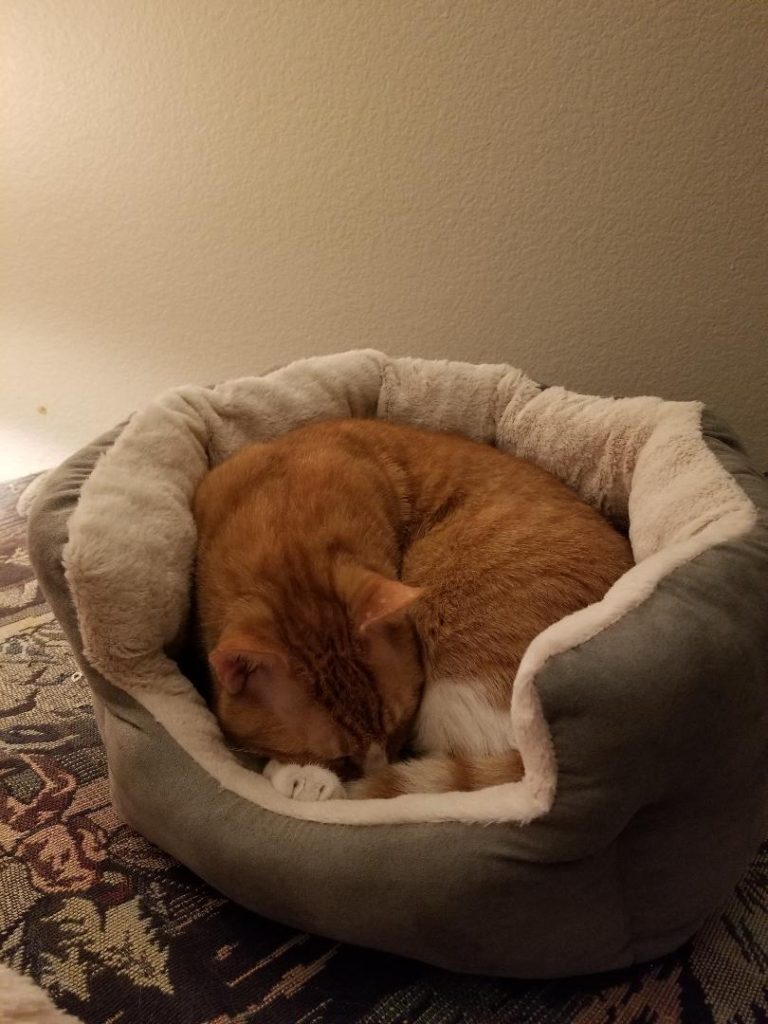
A few weeks ago, we noticed that our cat boy Marley is not as active and engaged with the family activities. Every time I come home from work, the boys patiently sit by the door and greet me when I walk in. For some time, Marley prefers to stay in the bedroom. He lays on my pillow and rests with his eyes closed. Marley eats food and drinks water, but somewhat less than usual.
The routine bloodwork at our vet clinic showed no concerning results. After brainstorming with the doctor, we decided to continue the investigation. Further testing revealed that Marley has a mass on the back of his mouth. Our veterinarian works on Marley’s additional diagnostics and treatment options. We are waiting to proceed with the plan.
Dealing with an illness in the family is tough. In addition to enormous emotional overwhelm, you may experience financial strain, work schedule issues, and technical challenges associated with medical aspects of care.
We want to share how we cope with our cat’s illness and give some insight and support to pet families faced with similar situations.
Dealing with Emotional Stress.
Receiving a cancer diagnosis for your loved one is a life-changing experience. Your entire world has changed in a short time. You may feel profoundly sad, hopeless, angry, and helpless. The new reality may make you withdrawn from social activities, hobbies, and things you used to enjoy.
Reach out to your social network.
Now is a time to connect with your family, partners, friends, and individuals willing to help. Utilize all the support you can get. Delegate as many tasks as you can. Anything counts. Someone can bring you dinner or help with shopping. Your relatives or friends may help with the house chores, spare time to pet sit your sick cat or run errands for you.
Check with animal welfare organizations. Volunteers often have a wealth of experience dealing with pet illness. You may receive valuable resources and advice on how to direct your efforts.
Educate yourself as much as you can.
Managing a sick pet can be overwhelming due to the medical aspects of your friend’s care. Medical terminology and the names of the diagnostic procedures, tests, and conditions can be very confusing. In addition to the intense emotional stress related to your friend’s illness, the complexity of the medical language can affect your capacity to make an educated decision.
Medical aspects of care.
Ask your veterinarian or vet technician to break the information down into smaller pieces and explain the concepts in simple words. You may request to explain the illness using visual diagrams, pictures, or models.
Discuss with your vet the potential risks and complications of the medical procedures. Talk about your pet’s quality of life, including pain, mobility, infection, and anxiety issues. Ask the doctor about the worst things that may happen if you do or decline the procedure or diagnostic test.
Learn how to manage medications.
Your cat’s condition may require giving medications at home. You will need to learn basic skills in handling and administering medications at home. You need to understand your pet’s diagnosis and know what organs and systems are affected. Knowledge of the fundamentals will lead you to a better understanding of the purpose of the medications.
Always follow your veterinarian’s prescription orders and clarify with the doctor if you don’t understand the order. Your veterinarian team will coach you on how to use syringes and pills. Learn about concentration and dosage for liquid medications. You may also administer subcutaneous fluids to your cat. If you still struggle, research options and hire a vet tech to help with the treatments.
Financial Strain.
Managing your pet’s illness can be challenging not only emotionally. The cost of veterinary diagnostics and treatments can be significantly expensive. Please never withhold care for your cat, assuming that you can not afford the treatment. There are many financing options available out there.
Check with your veterinary team, discuss the treatment plan and get all the estimates. Our cat, Smokey, had chemotherapy treatment, and the regimen was surprisingly manageable and affordable.
Utilize low-interest-rate financing options or an opportunity to pay your bill with no interest for 6 – 12 months, such as a Care Credit card. Make sure you clearly understand your credit company’s terms and conditions.
Work schedule issues.
Check with your family and friends. People may help watch your cat, give him medications, and feed him while you work. Talk to your supervisor and explain that your cat is sick and needs care. Discuss your schedules and see if you can have some flexibility to swap your days or shifts, work from home or utilize a hybrid work model. Use your paid time off, if necessary.
Take one step at a time.
When you first learn about your pet’s illness, you may feel overwhelmed. Receiving a cancer diagnosis or another condition is daunting and may affect your ability to understand the situation and make decisions.
It is crucially important to remain calm and take one step at a time. Ask your veterinary team to write down your cat’s treatment plan and break it into manageable parts.
Do one thing at a time. Don’t try to solve all the problems at once. For example, schedule an ultrasound or surgery and get ready for the appointment. Learn the necessary steps to prepare your cat for the procedure. Give the medications and adjust the feeding regimen. Remember to take one day and one thing at a time.
Enjoy time with your cat.
Managing illness is stressful and requires a lot of emotional, financial, and physical resources. You may feel overwhelmed, hopeless and exhausted.
Remember to embrace time with your pet and enjoy each other’s company. No matter how much time you have, make it a meaningful experience. When you get stressed, focus on technical aspects, practice medication skills, and ask your loved ones for help. Delegate care if possible and spend quality time with your cat. Try to have fun together, even if it’s a situation of illness. You need each other as never before.
Conclusion.
As a healthcare professional, I understand that our treatment options may be limited. As Marley’s loved one, I decided to stay strong and keep going. We will take one step, one thing, and manage one day at a time. We need each other more than ever before. Regardless of what our future brings, Marley is not alone, and we are in this together.

3 thoughts on “How To Cope When Your Cat Is Ill”
I need to to thank you for this good read!! I definitely loved every little bit of it. I have you book-marked to look at new things you postÖ
Thank you for your kind words. I greatly appreciate your comments and thoughts.
You need to be a part of a contest for one of the greatest websites on the internet. Im going to recommend this site!